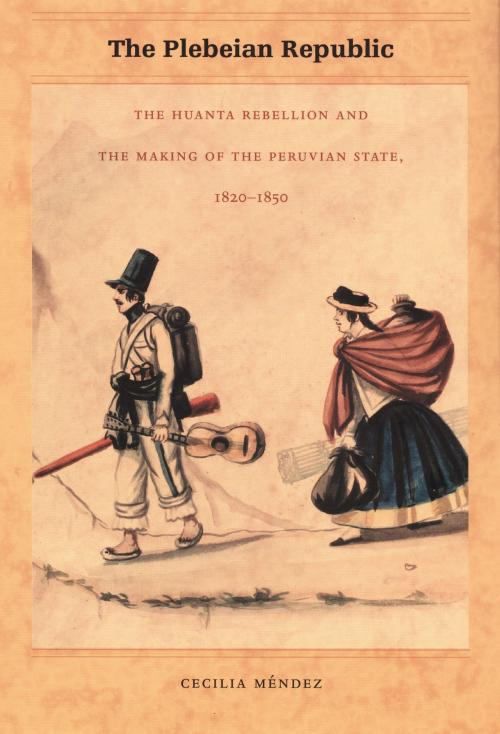The Plebeian Republic
The Huanta Rebellion and the Making of the Peruvian State, 1820–1850
Nonfiction, History, Americas, South America| Author: | Cecilia Méndez | ISBN: | 9780822386698 |
| Publisher: | Duke University Press | Publication: | April 21, 2005 |
| Imprint: | Duke University Press Books | Language: | English |
| Author: | Cecilia Méndez |
| ISBN: | 9780822386698 |
| Publisher: | Duke University Press |
| Publication: | April 21, 2005 |
| Imprint: | Duke University Press Books |
| Language: | English |
Combining social and political history, The Plebeian Republic challenges well-established interpretations of state making, rural society, and caudillo politics during the early years of Peru’s republic. Cecilia Méndez presents the first in-depth reconstruction and analysis of the Huanta rebellion of 1825–28, an uprising of peasants, muleteers, landowners, and Spanish officers from the Huanta province in the department of Ayacucho against the new Peruvian republic. By situating the rebellion within the broader context of early-nineteenth-century Peruvian politics and tracing Huanta peasants’ transformation from monarchist rebels to liberal guerrillas, Méndez complicates understandings of what it meant to be a patriot, a citizen, a monarchist, a liberal, and a Peruvian during a foundational moment in the history of South American nation-states.
In addition to official sources such as trial dossiers, census records, tax rolls, wills, and notary and military records, Méndez uses a wide variety of previously unexplored sources produced by the mostly Quechua-speaking rebels. She reveals the Huanta rebellion as a complex interaction of social, linguistic, economic, and political forces. Rejecting ideas of the Andean rebels as passive and reactionary, she depicts the barely literate insurgents as having had a clear idea of national political struggles and contends that most local leaders of the uprising invoked the monarchy as a source of legitimacy but did not espouse it as a political system. She argues that despite their pronouncements of loyalty to the Spanish crown, the rebels’ behavior evinced a political vision that was different from both the colonial regime and the republic that followed it. Eventually, their political practices were subsumed into those of the republican state.
Combining social and political history, The Plebeian Republic challenges well-established interpretations of state making, rural society, and caudillo politics during the early years of Peru’s republic. Cecilia Méndez presents the first in-depth reconstruction and analysis of the Huanta rebellion of 1825–28, an uprising of peasants, muleteers, landowners, and Spanish officers from the Huanta province in the department of Ayacucho against the new Peruvian republic. By situating the rebellion within the broader context of early-nineteenth-century Peruvian politics and tracing Huanta peasants’ transformation from monarchist rebels to liberal guerrillas, Méndez complicates understandings of what it meant to be a patriot, a citizen, a monarchist, a liberal, and a Peruvian during a foundational moment in the history of South American nation-states.
In addition to official sources such as trial dossiers, census records, tax rolls, wills, and notary and military records, Méndez uses a wide variety of previously unexplored sources produced by the mostly Quechua-speaking rebels. She reveals the Huanta rebellion as a complex interaction of social, linguistic, economic, and political forces. Rejecting ideas of the Andean rebels as passive and reactionary, she depicts the barely literate insurgents as having had a clear idea of national political struggles and contends that most local leaders of the uprising invoked the monarchy as a source of legitimacy but did not espouse it as a political system. She argues that despite their pronouncements of loyalty to the Spanish crown, the rebels’ behavior evinced a political vision that was different from both the colonial regime and the republic that followed it. Eventually, their political practices were subsumed into those of the republican state.















